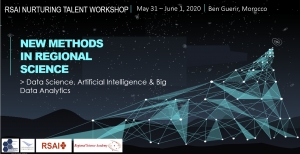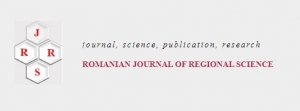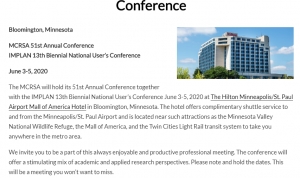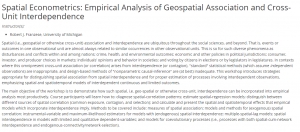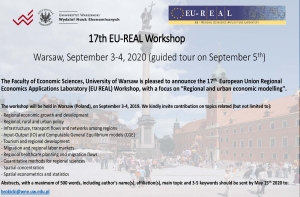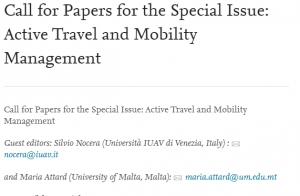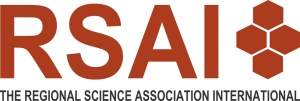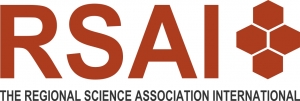Council
Elisabete Martins
Cancelled due to the Covid-19 outbreak - RSAI NURTURING YOUNG SCIENTIFIC TALENTS WORKSHOP | May 31 – June 1, 2020 | Ben Guerir, Morocco
This event was cancelled due to the Covid-19 outbreak.
RSAI NURTURING YOUNG SCIENTIFIC TALENTS WORKSHOP
New Methods in Regional Science:
Data Science, Artificial Intelligence and Big Data Analytics
- Coordinators of the project:
- Abdellatif Khattabi (AMSR) et
- Karim El Aynaoui (UM6P)
- Scientific Committee:
- Andrea Caragliu
- Eduardo Haddad
- Jean-Claude Thill
- Karima Kourtit
- Lakshmi Sivaramakrishnan
- Peter Nijkamp
- Saad Badaoui
- Said Lahssini
- Sumona Banerjee
- Tomaz Dentinho
- Organizing Committee:
- Erdogan H. Ekiz
- Hicham Mharzi Alaoui
- Said Lahssini
- Duration: 2 days: May 31 – June 1, 2020
- Venue/Location: UM6P, Benguerir, Morocco (close to Marrakech)
- Expected participants: 20-25 young scientists
The workshop is free of charge and the organizers will provide local logistics in Benguerir (accommodation and meals from the diner of May 30th to the lunch of June 2nd, local transportation on arrival and departure from Marrakech to Benguerir and from Benguerir to Marrakech) |
The volume of available data for research and policy has more than doubled in the past decade and shows an exponential growth. This new situation is also creating unexpected opportunities for regional science research. In order to seize such opportunities and examine the changing complexity of data structures and volumes, traditional methods in regional science need to be re-thought and re-designed. Data science brings innovative methods, information processes, complex algorithms and new digital systems, with the aim to harvest and extract knowledge from huge and big data using inter alia machine-learning and artificial intelligence techniques. Such techniques will be more than ever needed in modern regional science research. A presentation of such usual approaches will be given in a dedicated workshop in relation to the RSAI World Conference in Marrakech (Morocco).
This workshop will give an overview of methods, models and computational architectures related to the above topics. The workshop will involve lectures and practical sessions related to theory, tools and practices, case studies and student’s presentations. It will familiarize participants with new machine learning techniques, supervised and unsupervised learning, segmentation methods and deep learning. Participants will also gain experience in organizing data using traditional methods as well as more modern statistical and econometric approaches.
This two days’ workshop on “New Methods in Regional Science: Data science, Artificial Intelligence and Big Data Analytics”, meant for young scientists in Morocco and elsewhere in Africa and the whole world. It will be organized by the Moroccan Regional Science Association (AMSR) and the University Mohamed 6 Polytechnic (UM6P), in close association with the RSAI World Congress that will take place in Marrakech, Morocco, from June 2 – 5, 2020.
The workshop is offered to Master Students, PhD Candidates and early career researchers, with a view to enhancing their knowledge, their networking abilities, cooperation and start-up of their professional career. The meeting venue creates appropriate conditions, place and space to provide young scientists with a substantive training for their efficient and successful scientific career development, for the presentation of their new work, and for receiving feedback from inspiring senior scholars and from their peers.
The workshop’s organization cooperates with higher education institutions from Morocco and other countries. The workshop will create a multidisciplinary and multinational scientific environment and promises valuable scientific results in the form of new common research project proposals, publication outputs, support of young researchers, and development of scientific cooperation. Candidates have to apply for participation in this workshop.
The selection of participants for the workshop will be based on the quality of their applications. Applications for the workshop should include an outline of the research interest and motivation of Master or PhD students; brief description of the presentation that will be delivered; institutional affiliation and current position; reference from the home institution. The plan is to nurture new talent of about 5 Master Students, 10 PhD candidates and 5 early career researchers.
POTENTIAL KEY SPEAKERS (TENTATIVE)
- Theory and practice
- Jean-Claude Thill
- Michael Goodchild (tbc)
- Carlo de Weijer (tbc)
- John Osth (tbc)
- Laurie Schintler
- Parvathy Krishnan
- Case studies:
- Eduardo Haddad
- Peter Nijkamp
- Karima Kourtit
- Thomaz Dentinho
- Said Lahssini and Hicham Mharzi Alaoui
- Saad Badaoui
More information at: http://amsr.ma/RSAI_NT/
OECD Special Sessions at the 60th ERSA Congress
Dear Colleagues and Friends,
I would like to encourage you to submit your research and to spread the word about the 2 special sessions organised by the OECD Trento Centre jointly with partners.
Following the success of the last year special sessions on spatial productivity, the Spatial Productivity Lab at the OECD Trento Centre has partnered with the UK-based Productivity Insights Network to organise this year edition titled “The Spatial Dimension of Productivity for Regional Growth”. We are accepting submissions that tackle the issue of productivity from a regional/subnational perspective in a variety of contexts and under a range of angles. Please consider submitting your research and encourage others to do so!
This special session seeks to focus on the issues of competitiveness and sustainable economic growth within certain types of regions. Research that focuses on the mountainous regions, thin economies, island economies, marginalised rural areas, etc. would fit well. To give a few examples outside of the traditional urban-rural delineation, in Italy, the areas of interest can be inner areas and the Italian South; in the US, counties within the ARC fall within this topic.
Please submit your research and encourage others to do so.
As the OECD Trento Centre is launching a new stream of work on sustainable economic mountain development, if any people working on this or closely related topics come to mind, please share the names with us, so we can draw from their expertise and to form a network of interested researchers.
Thank you and hope to see every one of you in Bolzano in August.
With kind regards,
Alexandra Tsvetkova | Economist/Policy Analyst
Trento Centre for Local Development || Spatial Productivity Lab
Centre for Entrepreneurship, SMEs, Regions and Cities
Call for Papers | Special issue of the Romanian Journal of Regional Science (deadline April 12, 2020)
Call for Papers
Romanian Journal of Regional Science (rjrs.ase.ro) invites contributions for the special issue entitled ”Uncovering territorial inequalities and spatial justice in the EU”, under the auspices of the Horizon 2020 project IMAJINE – Integrative Mechanisms for Addressing Spatial Justice and Territorial Inequalities in Europe, with Ana Vinuela, University of Oviedo, Spain and Maria Plotnikova, Aberystwyth University, UK as Guest Editors.
The special issue is planned to be launched by mid-June, 2020. Submission deadline: April 12 at This email address is being protected from spambots. You need JavaScript enabled to view it.
The problem of territorial inequality is especially important for the EU. The European project has been a long-running process of the coming together of the European states into a single territorial unit. Territorial inequalities have long persisted in the EU. Following a period of convergence in the 1990s and early 2000s, the 2008 financial crisis had widened regional economic disparities in Europe. Territorial inequalities have been targets of policy intervention via regional policy and more recently, Cohesion policy with the objective to promote more balanced and more sustainable territorial development.
Policy intervention is deemed necessary because territorial inequalities in economic performance may over-time lead to divergence in levels and trajectories of development among regions, preventing lagging regions from reaching their potential and necessitating fiscal transfers from richer ones. Territorial inequalities engender migration flows from poorer to richer regions contributing to cumulative causation behind the persistence of inequalities. Territorial inequalities in unemployment and health bring about clusters of multi-dimensional deprivation, increasing reliance on welfare disbursements and public provision of services. Moreover perception of territorial inequalities in ‘lagging’ or ‘left-behind’ regions may foster what has been termed as the “geography of discontent” expressed in grass-roots movements, support for extreme political parties and anti-establishment voting behaviour (e.g. Brexit vote outcome in the UK).
The perspective of spatial justice offers a new angle for analysing and ultimately tackling territorial inequality. Inequalities may be understood as differences in opportunities available for individuals expressed through access to (e.g. education, jobs, healthcare, services, and, ultimately social mobility) that differ across space and where spacial differences in access interact with its socio-economic determinants such as class, gender, age, ethnicity and others.
Understanding territorial inequalities therefore requires greater attention to regional and local socio-economic contexts. Doing so brings to light the interrelationship between economic inequality and other location-specific factors such as differential capacity of regions and localities to sustain economic activity, absorb economic shocks and respond to policy intervention, including Cohesion policies.
We invite papers addressing the issues of territorial inequalities and conceptualization of spatial justice from any disciplinary area.
Cancelled due to the Covid-19 outbreak - RSAI NURTURING YOUNG SCIENTIFIC TALENTS WORKSHOP | May 31 – June 1, 2020 | Ben Guerir, Morocco
This event was cancelled due to the Covid-19 outbreak.
RSAI NURTURING YOUNG SCIENTIFIC TALENTS WORKSHOP
New Methods in Regional Science:
Data Science, Artificial Intelligence and Big Data Analytics
- Coordinators of the project:
- Abdellatif Khattabi (AMSR) et
- Karim El Aynaoui (UM6P)
- Scientific Committee:
- Andrea Caragliu
- Eduardo Haddad
- Jean-Claude Thill
- Karima Kourtit
- Lakshmi Sivaramakrishnan
- Peter Nijkamp
- Saad Badaoui
- Said Lahssini
- Sumona Banerjee
- Tomaz Dentinho
- Organizing Committee:
- Erdogan H. Ekiz
- Hicham Mharzi Alaoui
- Said Lahssini
- Duration: 2 days: May 31 – June 1, 2020
- Venue/Location: UM6P, Benguerir, Morocco (close to Marrakech)
- Expected participants: 20-25 young scientists
The workshop is free of charge and the organizers will provide local logistics in Benguerir (accommodation and meals from the diner of May 30th to the lunch of June 2nd, local transportation on arrival and departure from Marrakech to Benguerir and from Benguerir to Marrakech) |
The volume of available data for research and policy has more than doubled in the past decade and shows an exponential growth. This new situation is also creating unexpected opportunities for regional science research. In order to seize such opportunities and examine the changing complexity of data structures and volumes, traditional methods in regional science need to be re-thought and re-designed. Data science brings innovative methods, information processes, complex algorithms and new digital systems, with the aim to harvest and extract knowledge from huge and big data using inter alia machine-learning and artificial intelligence techniques. Such techniques will be more than ever needed in modern regional science research. A presentation of such usual approaches will be given in a dedicated workshop in relation to the RSAI World Conference in Marrakech (Morocco).
This workshop will give an overview of methods, models and computational architectures related to the above topics. The workshop will involve lectures and practical sessions related to theory, tools and practices, case studies and student’s presentations. It will familiarize participants with new machine learning techniques, supervised and unsupervised learning, segmentation methods and deep learning. Participants will also gain experience in organizing data using traditional methods as well as more modern statistical and econometric approaches.
This two days’ workshop on “New Methods in Regional Science: Data science, Artificial Intelligence and Big Data Analytics”, meant for young scientists in Morocco and elsewhere in Africa and the whole world. It will be organized by the Moroccan Regional Science Association (AMSR) and the University Mohamed 6 Polytechnic (UM6P), in close association with the RSAI World Congress that will take place in Marrakech, Morocco, from June 2 – 5, 2020.
The workshop is offered to Master Students, PhD Candidates and early career researchers, with a view to enhancing their knowledge, their networking abilities, cooperation and start-up of their professional career. The meeting venue creates appropriate conditions, place and space to provide young scientists with a substantive training for their efficient and successful scientific career development, for the presentation of their new work, and for receiving feedback from inspiring senior scholars and from their peers.
The workshop’s organization cooperates with higher education institutions from Morocco and other countries. The workshop will create a multidisciplinary and multinational scientific environment and promises valuable scientific results in the form of new common research project proposals, publication outputs, support of young researchers, and development of scientific cooperation. Candidates have to apply for participation in this workshop.
The selection of participants for the workshop will be based on the quality of their applications. Applications for the workshop should include an outline of the research interest and motivation of Master or PhD students; brief description of the presentation that will be delivered; institutional affiliation and current position; reference from the home institution. The plan is to nurture new talent of about 5 Master Students, 10 PhD candidates and 5 early career researchers.
POTENTIAL KEY SPEAKERS (TENTATIVE)
- Theory and practice
- Jean-Claude Thill
- Michael Goodchild (tbc)
- Carlo de Weijer (tbc)
- John Osth (tbc)
- Laurie Schintler
- Parvathy Krishnan
- Case studies:
- Eduardo Haddad
- Peter Nijkamp
- Karima Kourtit
- Thomaz Dentinho
- Said Lahssini and Hicham Mharzi Alaoui
- Saad Badaoui
More information at: http://amsr.ma/RSAI_NT/
Call for Papers: MCRSA 51st Annual Conference/IMPLAN 13th National Users Conference, June 3-5, 2020 Bloomington, MN
Mid-Continent Regional Science Association
51st Annual Conference
IMPLAN 13th Biennial National User’s Conference
~ June 3-5, 2020 ~ Bloomington, Minnesota ~
Call for Papers
The MCRSA will hold its 51st Annual Conference together with the IMPLAN 13th Biennial National User’s Conference June 3-5, 2020 at The Hilton Minneapolis/St. Paul Airport Mall of America Hotel in Bloomington, Minnesota. The hotel offers complimentary shuttle service to and from the Minneapolis/St. Paul Airport and is located near such attractions as the Minnesota Valley National Wildlife Refuge, the Mall of America, and the Twin Cities Light Rail transit system to take you anywhere in the metro area.
The program committee welcomes individual papers and organized sessions on a wide range of topics relating to applied economics, planning, geography, business, public administration, sociology, and political science.
The deadline for abstract submission is April 1, 2020.
Hotel Reservations:
The Hilton Minneapolis/St. Paul Airport Mall of America Hotel
3800 American Boulevard East · Bloomington, Minnesota 55425
Tel: 952-854-2100
Toll Free: 1-800-HILTONS
The conference room rate is $159 per night. The conference room rate will be honored three days before and after the conference. Onsite self-parking is complimentary for conference attendees. Complimentary shuttle service from and to the airport is available. To make a reservation, call 1-800-HILTONS and mention the Mid-Continent Regional Science Association (MCRSA) conference. You can reserve your room online by clicking here.
The cutoff date for the conference room rate is May 11, 2020
MCRSA Surcharge for Participants Not Staying at the Conference Hotel to Booking Outside the Conference Block
Note that attendees who do not register for an overnight stay at the conference hotel, The Hilton Minneapolis/St. Paul Airport Mall of America Hotel, or who book outside the conference room block, will incur an additional conference registration surcharge of $150. This surcharge does not apply to students or to attendees with a local business address, i.e. the Twin Cities area.
2020 M. Jarvin Emerson Student Paper Competition
The deadline for submission is April 1, 2020
The Mid-Continent Regional Science Association announces the Student Paper Competition for our 2020 conference (June 3-5) in Bloomington, Minnesota. All students enrolled in undergraduate or graduate degree programs as of January 1, 2020 are eligible. Student papers dealing with all aspects of regional development, including cultural, physical and economic processes, are welcome. The first place winner will receive $1,000 and the M. Jarvin Emerson Award. The winning entry will also be considered for publication in the Association’s journal, The Journal of Regional Analysis & Policy. Only papers authored solely by students (i.e., no faculty co-authored papers) will be eligible for the competition and resulting publication. Addition information can be found at http://mcrsa.org/student-paper-competition/
North Central Regional Center for Rural Development
Graduate Student Travel Grants to the MCRSA Conference
The North Central Regional Center for Rural Development (NCRCRD) at Michigan State University is partnering with the MCRSA to strengthen research capacity in the North Central Region. We’re doing so by offering a limited number of MCRSA conference travel grants to graduate students from NCRCRD member institutions. Students can request up to $500 to pay eligible travel-related expenses. Only M.S. and Ph.D. graduate students from NCRCRD-member institutions are eligible for these awards.
Information about the MCRSA conference is at:
Newly Expanded Spatial Econometrics Workshop in Ann Arbor, 20-24 July 2020
NEW & EXPANDED in 2020!* Workshop:
Spatial Econometrics: Empirical Analysis of Geospatial Association and Cross-Unit Interdependence
Robert J. Franzese, Jr. (This email address is being protected from spambots. You need JavaScript enabled to view it.)
Do the outcomes in the units or individuals of your research analyses cluster geospatially or within networks? Do some units’ or individuals’ outcomes depend on outcomes in other units/individuals? That is, are the outcomes of interest in your studies likely contagious from units to neighboring or otherwise proximate or connected units? Do the processes you study diffuse across units in some manner? Are there spillovers across subjects? If you study anything in the social sciences, and likely most things beyond, almost certainly they are/do.
This NEW & EXPANDED!* workshop (July 20-24 in Ann Arbor) teaches empirical methods for modeling, for estimating, and for the interpretation of such spatial or cross-unit clustering or interdependence (a.k.a., contagion/diffusion/spillover/network-dependence...).
*Now with more intro to models and methods for spatial or geospatial clustering (as opposed to contagion/interdependence) and distinguishing between the alternate sources of spatial association (common exposure, contagion, network selection).
Applied (computer-lab) sessions and exercises are bilingual, i.e. with lab scripts in Stata and R both available, and students are of course welcome to use other software as they prefer.
Register through the ICPSR Summer School portal, linked here:
http://www.icpsr.umich.edu/icpsrweb/sumprog
The course description from the ICPSR website is linked here & copied below:
http://www.icpsr.umich.edu/icpsrweb/sumprog/courses/0129
Spatial Econometrics: Empirical Analysis of Geospatial Association and Cross-Unit Interdependence
20-24 July 2020
PLEASE DO EMAIL (This email address is being protected from spambots. You need JavaScript enabled to view it.) with any & all questions
Description: Spatial (i.e., geospatial or otherwise cross-unit) association and interdependence are ubiquitous throughout the social sciences, and beyond. That is, events or outcomes in one observational unit are almost always related to similar occurrences in other observational units. This is so for such diverse phenomena as disturbances and conflicts within and among nations; crime, health, and environmental outcomes; economic and other policies in political jurisdictions; consumer, investor, and producer choices in markets; individuals’ opinions and behavior in societies; and voting by citizens in elections or by legislators in legislatures. In contexts where this omnipresent cross-unit association (or correlation) arises from interdependence (or contagion), "standard" statistical methods (which assume independent observations) are inappropriate, and design-based methods of "nonparametric causal-inference" are (at best) inadequate. This workshop introduces strategies appropriate for distinguishing spatial association from spatial interdependence and for proper estimation of processes involving interdependent observations, emphasizing spatial and spatiotemporal models of interdependent continuous and limited outcomes.
The main objective of the workshop is to demonstrate how such spatial, i.e. geo-spatial or otherwise cross-unit, interdependence can be incorporated into empirical analysis most productively. Course participants will learn how to: diagnose spatial-correlation patterns; estimate spatial-regression models; distinguish between different sources of spatial correlation (common exposure, contagion, and selection); and calculate and present the spatial and spatiotemporal effects that empirical models which incorporate interdependence imply. Methods to be covered include: measures of spatial association; models and methods for (exogenous) spatial correlation; instrumental-variable and maximum-likelihood estimators for models with (endogenous) spatial interdependence; multiple-spatial-lag models; spatial interdependence in models with limited and qualitative dependent-variables; and models for coevolutionary processes (i.e., processes with both spatial-cum-network interdependence and endogenous-connectivity/network-selection).
Prerequisites: None; in particular, although participants should be familiar with linear regression and models for qualitative/limited dependent variables (e.g., logit, probit, etc.), this workshop does not assume any prior knowledge of, or experience with, spatial statistics. Indeed, all necessary mathematical, statistical, geospatial-analytic, and spatial-econometric background will be reviewed as needed, albeit (obviously) very quickly.
EU REAL meeting Warsaw 2020
Dear Colleagues,
Attached, please find the call for papers for the next EU REAL meeting that will be hold in Warsaw on September 3-4 2020.
This is the week following the ERSA conference, so it could be a good reason to extend your stay in Europe if you already plan to attend the ERSA.
Hope to meet you all in Warsaw!
Bart Rokicki
Call for Papers for the Special Issue: Active Travel and Mobility Management.
Dear NECTAR colleagues,
Silvio Nocera (Università IUAV di Venezia, Italy) and Maria Attard (University of Malta, Malta) are launching a Call for Papers for the Special Issue: Active Travel and Mobility Management.
This is linked to the NECTAR Joint Meeting of Cluster 2: Policy and Environment and Cluster 7: Social and Health Issues, to be held in Venice, Italy, 26-27 March 2020. However, Guests Editors welcome papers not necessarily presented at the Meeting.
Best wishes
--
Ana Condeço-Melhorado
NECTAR Secretary
Nominations to RSAI Fellows – Deadline: April 6, 2020
Nomination and Selection Protocol of RSAI Fellows
- Each RSAI member - except RSAI fellows – is entitled to nominate candidates for the RSAI fellowship, but self-nominations are not allowed. Each nomination has to be done through a standard concise nomination form that follows a systematic template.
- A nominee has to be RSAI member (or a member of any section recognized by the RSAI) and to meet the qualifications mentioned in Annex A.
- The selection of new RSAI fellows takes place only once a year, but nominations can be sent in at any time and will be considered for a given selection round, if they have been received before a given deadline. A nomination has a maximum life of two years.
- All nominations will be put on a list supplemented with non-elected candidates for the RSAI fellowship who were on the short list from the previous year.
- The short list will be screened by the RSAI fellows selection committee (in consultation with the RSAI director). This committee comprises 3 RSAI fellows appointed by the RSAI Council for a period of staggered 3-year terms. The selection committee has to seriously consider all available information on the candidates and can remove candidates (unanimous vote) who do not qualify.
- The selection committee can also decide to reduce the list of nominated RSAI members to a manageable number, so that candidates can be selected with a qualified majority. This short list should normally not contain more than 10 to 12 names.
- The short list is next circulated to all RSAI fellows, who have the exclusive right to vote for (a maximum of) 3 candidate-fellows. No ranking of candidates is allowed.
- The selection committee can put an upper ceiling on the maximum number of candidates to be selected in a given year, if circumstances dictate so.
- A vote of at least 1/3 will normally mean election, unless that would exceed the ceiling.
- The selection committee informs the RSAI Director of the final selection results, who will communicate these results to the selected RSAI fellows, the RSAI Council, and the home institutions of the newly appointed fellows.
Standard Nomination Form for RSAI Fellows
- Factual bio-data on candidate, including a proof for RSAI membership
- Professional career of candidate (max. 100 words)
- Substantive contribution to regional science (max. 200 words)
- Path-breaking publications on regional science (max. 5)
- Signs of international scientific recognition (max. 50 words)
- Reasons for nominating the candidate (max. 50 words)
To ensure full consideration by the committee, these materials should be provided in electronic format (pdf preferred) by April 6, 2020 to Kieran Donaghy (This email address is being protected from spambots. You need JavaScript enabled to view it.), Chair 2020 Fellows Election Committee and cc to Andrea Caragliu (This email address is being protected from spambots. You need JavaScript enabled to view it.), Executive Director of RSAI.
Call for candidatures for the 2020 RSAI Founder's medal
Dear RSAI members,
I hope this email finds you all well.
This year many exciting events are expected in our Association. In a few months (June 2-5) we will celebrate the 13th World Congress of the RSAI. Submissions have passed the 600 threshold and represent authors from 58 Countries, with 39 special sessions submitted from some of the best regional scientists worldwide. Thank you! We all look forward to seeing many of you at the congress venue.
I am also writing you to elicit candidatures (as well as self-nominations) for the 2020 edition of the prestigious RSAI Founder’s Medal. As you probably know, this is among the most importand prizes awarded by the Association, and is bestowed every four years to outstanding regional scientists for outstanding contributions to our discipline. More information on the prize can be found here:
http://www.regionalscience.org/index.php/awards/rsai-founder-s-medal.html
Nominations should be sent within March 27 to the RSAI Executive Director (This email address is being protected from spambots. You need JavaScript enabled to view it.). Candidatures will then be screened by a committee appointed by the RSAI Council, which consists of Mark Partridge (President); Philip Mc Cann; Lily Kiminami; Andrés Rodrigues Pose; and Dan McMillen. The announcement of the recipient will take place during the next RSAI World Congress in Marrakech.
A written nomination/self-nomination of a candidate for consideration for the RSAI Founder’s Medal should articulate the merit of the nominee for receiving the Founder’s Medal. It must include a detailed statement of the nature of the lifetime contribution a candidate has made to RSAI. The nomination/self-nomination must explain how and why that contribution of the nominee meets the criteria of the RSAI Founder’s Medal outlined below:
- The recipient should be a senior scholar who has contributed in an important way to the field of Regional Science in a scholarly sense;
- The recipient should have been active in the RSAI for a sustained period, but not necessarily active at the time of the award; also, the award is not given posthumously;
- The recipient should be a person with whom many members can identify; his/her contributions could be a major work in one area or many works in several areas;
- The contribution need not be limited to one type of contribution; it might be theory, method or policy, for example;
- It is recognized that the native country and language of scholars affect the extent to which they are known by the membership, and an effort should be made to take this into account.
Thank you all in advance for your participation in the process,
Kind regards,
-- -- Andrea CaragliuExecutive Director, Regional Science Association InternationalAssociate Professor of Regional and Urban EconomicsPolitecnico di MilanoABC DepartmentPiazza Leonardo da Vinci, 3220133 Milan (MI)Italy
About Us
The Regional Science Association International (RSAI), founded in 1954, is an international community of scholars interested in the regional impacts of national or global processes of economic and social change.

